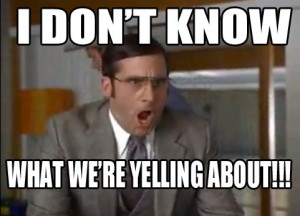How to Disagree Without Being Disagreeable by Suzette Haden Elgin
Written by Ashley Kelmore, Posted in Reviews
Three Stars
A few weeks back a good friend and I got into a disagreement, the details of which irrelevant. It lasted maybe five minutes then the day went on as usual, no hard feelings or underlying grumpiness. But there was something about the way we interacted that made be wish it had been different. I generally don’t like disagreeing with a couple of my friends who seem extraordinarily confident that their opinions are fact because I end up feeling a bit off. I don’t agree, but I’m not entirely sure how to get that across without being an ass.
I did a little research into how to disagree with someone without acting and sounding like a jerk, and this book repeatedly rose to the top. It’s a bit academic but very easy to read; the three star rating is more a function of the fact that this book is nearly 20 years old and could definitely benefit from an update that addresses internet interactions. Unfortunately Dr. Elgin passed away about a year ago, so any update would need to be done by another author.
Dr. Elgin is probably better known to folks as a science fiction author, but she’s also an expert in language studies. The main premise of this book is that people aren’t (usually) jerks to be jerks. She suggests that there are instead different ways of viewing discussions, including discussion as combat, life as a football game and life as a schoolroom. It’s sort of fascinating, and allegedly backed up by research. She offers different scenarios and ways to go about both diffusing them and avoiding getting into them in the first place.
She also calls b.s. on a lot of the common thinking about differences in the way genders communicate, and instead suggests those differences are more about who is in (or attempting to demonstrate) power. I found that to be a fairly spot-on commentary, although it opens up a whole other line of questioning around the expectations of women when they speak, including the desire that we should be agreeable. Are men out there buying books like this?
I do wish she’d spent a bit of time looking at how language is used in intentionally hostile ways, which she suggests is rare. I’m guessing that any woman on Twitter (especially women of color) would beg to differ, and it’s possible that the suggestions in this book aren’t helpful in those instances.
Of course, as I say that, I just checked amazon and apparently she did issue an updated version in 2009 that looks at how to handle ‘casual racist and sexist language;’ unfortunately it doesn’t seem to be in print still. I’m going to guess that if you’re interested and can find it, the 2009 version would be better.

